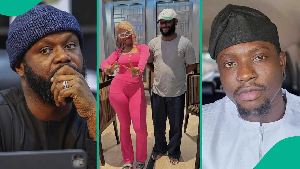Politics of Wednesday, 9 July 2025
Source: www.legit.ng
Coalition 2027: Actual amount of previous nomination form for ADC presidential candidates emerges
As Nigeria inches closer to another pivotal electoral cycle in 2027, the spotlight returns to the African Democratic Congress (ADC) with renewed scrutiny over the cost of its presidential nomination forms.
Although 2027 is already shaping up as a landmark political year, it was in the build-up to the 2023 general elections that the ADC priced its presidential Expression of Interest and Nomination forms at ₦25 million per aspirant.
While the party has not officially announced a revised fee, political watchers speculate whether this figure will remain unchanged or face an upward review, reflecting shifting dynamics and inflationary pressures. Back in 2023, ten prominent Nigerians boldly picked up the ₦25 million forms to contest the ADC presidential primary.
Among them were: Chukwuka Monye, Prof. Kingsley Moghalu, Dr. Chike Okogwu, Dr. Mani Ibrahim, Joyce Ogochukwu Nsaka, Bishop Ify George Oforkans, Princess Chichi Ojei, Lady Angela Johnson, Dumebi Kachikwu and Muhammad Lamido. Party insiders hinted that more aspirants were waiting in the wings, while interest from members of the APC and PDP surged in the final days leading to the ADC primary deadline.
ADC adopted as coalition vehicle In a dramatic shift within Nigeria’s political landscape, the ADC has been formally adopted as the official platform for a broad opposition coalition aiming to unseat the ruling All Progressives Congress (APC) in the 2027 presidential election.
The coalition, led by former Vice President Atiku Abubakar, includes political heavyweights such as Peter Obi, Rotimi Amaechi, Nasir El-Rufai, David Mark, and Rauf Aregbesola.
The coalition’s unveiling in Abuja drew national attention, with David Mark appointed interim national chairman and Aregbesola named secretary. The alliance is positioning itself as a credible alternative to the Tinubu administration, with a manifesto focused on national unity, economic reform, and democratic governance.
Despite its ambitious goals, the coalition faces internal challenges. Rotimi Amaechi has declared his intent to run for president under the ADC banner, pledging a one-term presidency to honour southern rotation. Meanwhile, Peter Obi remains a central figure, with youth groups and his 2023 running mate, Datti Baba-Ahmed, insisting he must lead the ticket—not serve as vice president.
Atiku Abubakar, though yet to formally declare, is reportedly mobilising support in the North, banking on regional strength and political longevity. These competing ambitions have sparked speculation about potential fractures within the coalition, especially as consensus-building remains elusive.
While the ADC’s adoption has energised the opposition, it also exposes the party to risks of elite capture and factionalism. Dumebi Kachikwu, a former ADC presidential candidate, has criticised the coalition’s takeover as a “hostile hijack”. Analysts warn that without grassroots mobilisation and internal cohesion, the coalition may replicate the failures of past alliances.
Still, the ADC’s expanded visibility and strategic positioning offer a rare opportunity for opposition forces to consolidate. Whether it can translate elite endorsements into electoral success will depend on its ability to build a truly national footprint and navigate Nigeria’s complex political terrain.












